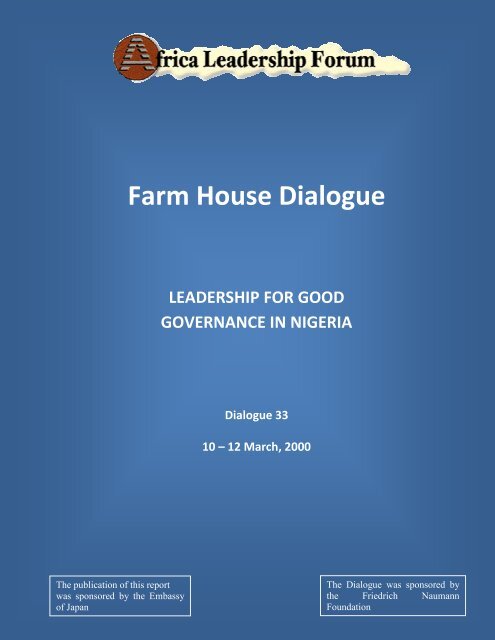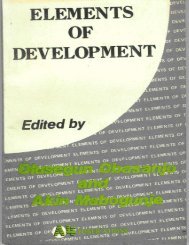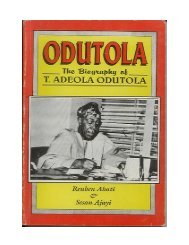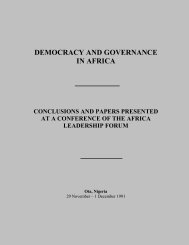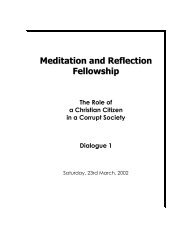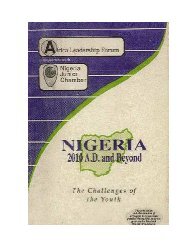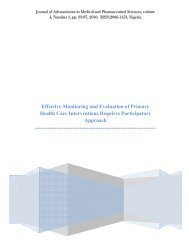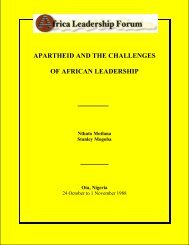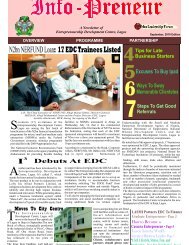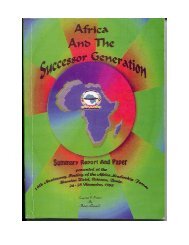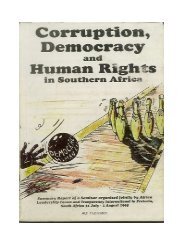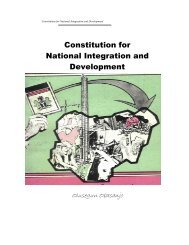Farm House Dialogue - Africa Leadership Forum
Farm House Dialogue - Africa Leadership Forum
Farm House Dialogue - Africa Leadership Forum
Create successful ePaper yourself
Turn your PDF publications into a flip-book with our unique Google optimized e-Paper software.
<strong>Farm</strong> <strong>House</strong> <strong>Dialogue</strong>LEADERSHIP FOR GOODGOVERNANCE IN NIGERIA<strong>Dialogue</strong> 3310 – 12 March, 2000The publication of this reportwas sponsored by the Embassyof JapanThe <strong>Dialogue</strong> was sponsored bythe Friedrich NaumannFoundation
<strong>Farm</strong> <strong>House</strong> <strong>Dialogue</strong> – Principles and GuidelinesThe <strong>Dialogue</strong> is neither a political gathering nor is it a gathering for chastisement andcondemnation. It is basically a brainstorming activity. Everyone is at liberty to freelyexpress his or her opinions.It is a concerned attempt to search for solutions to national problems through discussions.It does not seek to delve into who brought about the particular predicament to the nation.Although a knowledge of how the nation got to a specific impasse or difficult situationmight provide useful lessons for the future.It, instead, attempts to engage in a proper analysis of national problems and arrive throughdiscussion and dialogues at practical suggestions and recommendations, which may helpin resolving all or parts of these problems.In consequences, the <strong>Dialogue</strong> places great emphasis on selecting individuals whoparticipate in the discussion, noting the importance of inviting always, personalities withthe knowledge and insight into particular national issues being discusses and who canmake substantial contributions.It aims not always to reach consensus but to provide opportunity for recording honestdisagreements on vital national issues.Each <strong>Dialogue</strong> will result in a publication that will capture the essence of the discussionand the main conclusions reached.
Table of ContentsPage<strong>Farm</strong> <strong>House</strong> <strong>Dialogue</strong> – Principles and GuidelinesIntroduction ……………………….……………………………………… 1Operational Framework……………………...……………………………. 3Conceptual Clarification ………………………………………………….. 3A Leader ………………………………………………………………… 4<strong>Leadership</strong> ………………………………………………………………… 4Governance ……………………………………………………………….. 4<strong>Leadership</strong> Recruitment Process…………………………………………... 4Relationship between <strong>Leadership</strong> & Governance…………………………. 5Constraint to Enlightened <strong>Leadership</strong> For Good Governance …………… 5Dynamics of Achieving Enlightened <strong>Leadership</strong> for Good Governance … 8Strategies for Promoting Good Governance and Mind Restructuring….… 11Conclusion and Recommendation ………………………………………… 13Annexure I- List of Participants …………………………………………... 16Annexure II-Chairman’s Opening Remarks by Professor Anezi N. Okoro… 20Background Note on the <strong>Africa</strong> <strong>Leadership</strong> <strong>Forum</strong> ………………………… 39
33rd <strong>Farm</strong> <strong>House</strong> <strong>Dialogue</strong><strong>Leadership</strong> for Good GovernanceChairman: Professor Anezi N. OkoroRapporteur: Folashade Fakande- AbayomiEditor: Dr. Reuben AbatiIntroduction:The <strong>Africa</strong> <strong>Leadership</strong> <strong>Forum</strong> held the 33rd edition of the <strong>Farm</strong> <strong>House</strong> <strong>Dialogue</strong> on<strong>Leadership</strong> for Good Governance at the <strong>Farm</strong> Gate Hotel Complex, Ota from the 10th-12th of March, 2000.Welcoming participants to the <strong>Dialogue</strong>, Ayodele Aderinwale, ALF Director, restated theessence of the <strong>Farm</strong> <strong>House</strong> <strong>Dialogue</strong>. The <strong>Dialogue</strong>, he said, is one of the most enduringprogrammes of the <strong>Farm</strong> focused at interrogating national issues and problems andproviding a platform for a broad based contribution to national policy formulation andfocus. He, therefore enjoined the participants to be frank in their contributions andinterventions so that the overall essence and objective of the dialogue would not bedefeated. He also expressed gratitude to the Friedrich Naumann Foundation for providingthe financial resources that has made this <strong>Dialogue</strong> possible.In her own remarks, the Country Representative of the Friedrich Naumann Foundation,Mrs. Gisela Wahle-Girkes, pointed out that while Nigeria’s return to democracy hasprecipitated high hopes for a fresh start and national reconstruction, the recent cases ofethnic and religious violence within the country have equally provided grounds for newapprehensions that have made dialogue inescapable if the fledgling democracy mustsurvive. <strong>Dialogue</strong>, she pointed out, is the key to national development and survival to theextent that it facilitates a peaceful resolution of conflicts and disagreements.In his introductory address, the <strong>Dialogue</strong> Chairman, Professor Anezi Okoro, examined thevarious leadership dynamics, complexities and contradictions that have transported<strong>Africa</strong>n countries from the misfortunes of colonial domination to the damnation of badgovernance and the consequent misery that has become the lot of most <strong>Africa</strong>ns. <strong>Africa</strong>nleaders, he said, have through a complex mix of mismanagement, pandemic corruption,primitive greed and gross incompetence, comprehensively retarded the growth of theirnations and peoples and consigned them to the lowest rungs of global economic ladder. Helamented the tragic irony of <strong>Africa</strong>’s abject poverty in the midst of its often stated superabundantnatural and human resources. This he attributed partly to historical hangoversand subsequent neo-colonial manipulation, actively aided by the divisive internal forcesdeeply entrenched at the heart of many <strong>Africa</strong>n societies in the face of which both leadersand the followers have remained lamentably helpless, and at times, criminally negligent.
According to Professor Anezi Okoro, the way forward for <strong>Africa</strong>, nay Nigeria, lies in athorough mind-restructuring, a kind of behavior al modification of the citizens in order toarrest the pervasive decay in and nurture the sprouting of a new life out of the rubbishheap of our collective failures. This could only be done, if Nigerians are prepared to tunein to the challenges posed by the high standards set by the 21st century. That is, thestandard of science and technology , total honesty, openness and pragmatism, toleranceand temperance, love and ethics, democracy, liberty, hard work and enterprise. WhenNigeria and Nigerians are prepared to abide by these standards, they could then hope to benumbered among the comity of civilized people. (See Annexure II for full text)With the Chairman’s address setting the scene, participants attempted to grapple with thetask ahead by identifying a number of issue areas to serve as a road map for thediscussion. They observed that corruption remains an abiding problem in both the privateand public sectors making it almost impossible for many Nigerians to provide selfless andtransparent leadership. The effect is that this lack of essential public spirit has turned misgovernanceinto something close to a normative pattern. Participants further argued thatthere has been deliberate attempt by those in positions of authority to alienate the masses,and in this regard, the exclusion of women from public life on the grounds of culture andother prejudices has been most vicious. <strong>Leadership</strong> and governance requires an active andqualitative interaction between the leaders and the led as a way of defining minimumstandards required for developing society, to provide checks and balances, and to open upa communication channel between both sides. In this regard, participants recognized theneed to identify strategies for the creation and nurturing of good leadership as well as theprovision of an enabling environment for good governance through the establishment ofstrong and efficient structures. <strong>Leadership</strong>, they added, ought to be considered in a globalsense in order to appreciate the collective responsibility that individuals, groups, andinstitutions share in determining the pattern of leadership that are desirable in society.<strong>Leadership</strong>, however is to be distinguished from management but the central question isone of vision, the capacity to translate defined responsibilities into action and therecognition of the centrality of ethics in leadership and governance. The followingoperational framework was subsequently adopted:
Operational Framework:1. Conceptual Clarificationa. <strong>Leadership</strong>b. Governancec. <strong>Leadership</strong> Recruitment Processd. Relationship between <strong>Leadership</strong> and Governancee. Constraints to Enlightened <strong>Leadership</strong> and Good Governance2. Dynamics of Achieving Enlightened <strong>Leadership</strong> for good Governancea. Political Structuresb. Corruptionc. Lack of National Consensusd. Religion and Culturee. Media3. Strategies for Promoting Good Governance1. Conceptual Clarificationa. A leader: Participants defined a leader as someone who stimulates and influences othersfor the purpose of achieving common interests or objectives. A good leader must possessthe following qualities: tolerance, charisma, honesty and transparency, firmness, openmindedness,drive, vision, responsibility, humanity, knowledge, experience, fairness,ability to inspire and a sense of mission.b. <strong>Leadership</strong>: leadership on the other hand was defined as a mechanism or process ofinfluencing and mobilizing human and material resources towards attaining a commongoal.c. Governance: governance was defined as the exercise of political, economic and socialauthority to regulate human interaction for the well being of the society. Whereas goodgovernance is a state of satisfactory fulfillment of expectations and the achievement ofsocietal well being by the mandated authority. Thus, the attainment of good governancerequire accountability, transparency, rule of law and human rights, responsiveness, astrong civil society, free press, social sanction and reward system, popular participation,efficient systems and structures.d. <strong>Leadership</strong> Recruitment Process: participants also tried to identify the various meansthrough which a leader can emerge. It was agreed that a leader can be produced through a
mixture of co-option, ascription, appointment and election. A leader can also emergethrough voluntary contribution to community development, through personal successachievements, public opinion or choice, visionary objective or simply by self-imposition.e. Relationship between <strong>Leadership</strong> and Governance: participants agreed that to havegood leadership and good governance, there must be an enabling environment, interms of political stability. Active popular participation in governance and theactivities of government was also identified as a crucial factor. Closely related to this,is the empowerment of civil society as a way of ensuring the inputs of trade unions,the media, women groups, students union bodies, NGOs and Community BasedOrganizations (CBOs) - to serve as a strong countervailing force against the excesseswithin the system.f. Constraint to Enlightened <strong>Leadership</strong> for Good Governance: in examining thefactors that militate against good governance and enlightened leadership, participantsagreed that all those factors that constitute moral or ethical issues could operate asretardant to the emergence of effective leadership and good governance when they areabsent in a polity. These include, corruption, ethnocentrism, the politics of exclusion,discrimination, political instability as symbolized by military intervention, politicalopportunism, economic mismanagement, weak social institution, weak bureaucracy,lack of transparency, job insecurity and unemployment, nepotism, mediocrity, lack ofpatriotism and sycophancy, lack of national consensus, communication gap betweenthe government and the governed, social political alienation, lack of respect for therule of law, endemic poverty and low human development, poor populationmanagement strategies, faulty educational system, environmental degradation,intolerance, inconsistencies in government plans and lack of continuity etc.Participants summed up that all or most of these have conspired to make theemergence of good leadership and effective governance difficult in Nigeria.It was therefore suggested that for Nigeria to make progress, a number of structures wouldhave to be put in place:A national awareness programme and grassroots mobilization empowerment could bedesigned to redirect public attitudes and expectations and inspire them towards patrioticconduct.The economic base of the country should be expanded and diversified to actively involvethe people in stimulating national growth and economic prosperity, and to empower themfor the enhancement of living standards.
The country should be restructured to give full effect to the principle of federalism asconstitutionally defined to assuage the fears of groups within the polity that arecomplaining of marginalization.Participants further agreed that oversight in the country’s legal framework, includingcontentious and obsolete legislation, can be corrected through comprehensiveconstitutional and legal reforms.The civil service is part of the problem, bogged down as it is by red-tapism andinefficiency. It should be reformed, retrained and re-oriented. In this direction, meritshould be the primary consideration in public appointments.To guarantee political stability, the armed forces should be re-organized, made moreprofessional, and its members should be re-oriented to better appreciate the constitutionalrole of the military and its relations with other institutions in civil society.National security in terms of the security of lives and property should be a principalconcern of government. The State Security Service as well as the Police should be betterequipped, constantly evaluated and in a state of preparedness, to enable them dischargetheir duties more efficiently.Civil society should be empowered through the deliberate promotion of collectiveparticipation and the expression of fundamental human rights by all stake-holders in theNigerian project.Improved participation and representation of women in decision making processes, andshould be ensured through such measures as proportional representation, the abrogation ofharmful traditional practices and legislation which interiorize women and the introductionof affirmative action for women as state policy.Other measures suggested by participants included a comprehensive poverty alleviationand ultimate eradication programme that involves the promotion of small and mediumscale entrepreneurship, integrated agricultural and rural development and extension,effective fiscal management, planning and data management.Participants reasoned further that existing structures for leadership recruitment process issomewhat skewed in the direction of cronyism, gerontocracy and nepotism and is thus atvariance with the need to develop qualitative leadership. What this implies is thatdesignated leadership training institutions such as the Nigerian Institute of Policy andStrategic Studies (NIPSS), Administrative and Staff College of Nigeria (ASCON) and theCentre for Management Development (CMD) would have to be better organized. Agreater national emphasis should also be placed on the identification and nurturing of a
successor generation that is carefully groomed and tutored to meet the various challengesthat the country is bound to encounter in a more dynamic and competitive world.It was also discussed and agreed that attempts should be made to create new nationalinstitution for leadership development. In this regard, institutions like NIPSS, ASCON andCMD should review their recruitment processes to focus on young mid-careerprofessionals with demonstrable track record of achievement and potentials. In addition,private initiatives such as the Lagos Business School (LBS), should make their facilitiesavailable for leadership training process. Private sector input in this respect is imperativeand should be encouraged.2. Dynamics of Achieving Enlightened <strong>Leadership</strong> for Good GovernanceParticipants defined internal factors as those structures within the society that promoteor militate against the emergence of enlightened leadership and good governance.(a) Political Structures: in this light, participants noted that the political structuresupon which the Nigerian society is built are fraught with several contradictions andlimitations. They argued that the relationship between the various armsgovernment as complementary institution is very vital for the emergence of goodleadership and governance. They however, lamented the rather sad case ofcontinuous conflict that has characterized the relationship between the executiveand the legislature in the present democratic dispensation. For the most part, theExecutive and the Legislature have been at daggers drawn, accusing each other ofa certain lack of faith. The democratic enterprise is strengthened by the oppositionthat is constructive, not the kind of national sabotage that is being engineered.What is required is improved liason between both parties and a properunderstanding of the limit of powers ascribed accordingly within the constitution.(b) Corruption: participants also noted that corruption has remained one of the majorproblems militating against good governance in Nigeria, made possible by lack oftransparency and control, and the subversion of civil service ethics and standardsby a pre-bendal power-elite that is shamelessly committed to its own self-interest.(c) Lack of National Consensus: another major problem that the participants noted isthe failure of public officials to distinguish between personal or ethnic, or partisanpolitical interests and what may be called the national interest. The confusion thathas resulted from this is that oftentimes, the former is allowed to override the latterwith the formulation of out rightly contradictory policies and mutual ethnicsuspicion and restiveness as outcome.
Participants agreed that a major factor responsible for this unsavory developmentis the inability, indeed the refusal, of the Nigerian power-elite to formulate andconsciously foster a consensus on fundamental national issues. While it may bedifficult to convert a central consensus into a ground norm considering thediversity and multiculturalism of the Nigerian society, it is nevertheless possiblefor the elite to provide leadership in articulating and realizing an irreducibleminimum standard that serves as the fulcrum of the social contract. Nigeria’spower-elite has failed the country in this important regard. What has been activelypromoted is not a clear and unified national agenda, but the personal andsubjective agenda of the power-elite which in its full effect merely reproduces thecontradictions among the elite, their greed for power and authority and theirdisconnection with the majority.Participants recognized that the problem with the elite class in Nigeria is itscommitment to certain kind of conspiracy. When it suits its own interest, it hasdemonstrated a capacity to activate that loyalty and present it with a consensus inthe national interest but in due course, a constellation of event almost alwaysinvariably exposes the lie beneath that pretense. Participants cited the examples ofthe near-unanimous opposition to dictatorship during the Abacha days. But theirony is that whereas the elite were opposed to autocracy, they seem to be findingit difficult at the moment to support democratic rule. Inconsistent elite createsproblems for its own ranks and for society.The Nigerian elite, including the power-elite and the broad range within the middleclass , owes itself the duty to undertake confidence building measures to reinforceits commitment to the Nigerian project: a project whose primary focus should bethe banishment from all forms of structural and social alienation, and mobilizationof the Nigerian people, their empowerment and the creation of a nationalmomentum that is commonly-designed and owned and enthusiastically promotedby both the elite and the non-elite.It was also observed that the elected officials appear not to understand the rolesand responsibilities attached to their respective offices. While this may beattributable to wrong and opportunistic expectations from the electorate, the truthis that elected officials themselves contribute to the problem by making unrealisticpromises and by creating the false impression that the effect of public service isautomatic self-enrichment.(d) Culture and Religion: these were further identified as a major factor in thepromotion of enlightened leadership and good governance. It would appear thatthere is an understanding and an acceptance of positive human values and ideas inevery culture and religion. The problem in Nigeria, according to participants, hasbeen the tendency of politicians and other constituencies to manipulate culture and
eligion as instrument of political control, sabotage, and discrimination against thepowerless and the less privileged. Women have been particularly vulnerable. Theyare the target of all kinds of religious and cultural superstitions which discountstheir humanity. Participants opined that religion can and should be used as apositive force for promoting unity and ethical leadership and that religioustolerance should be promoted by both government and civil society institutions. Inthe same vein, communities should be educated to abandon harmful traditionalpractices which are inconsistent with the rule of law and the promotion of theobjective of good neighbourliness.(e) Media: participants further acknowledge the strategic role played by the media inthe struggle against military dictatorship. It was however, noted that mediainstitutions often lend themselves to easy use and manipulation by the elite forexacerbating national tension and crises. It was therefore suggested that the mediashould be objective, responsible and patriotic and help to set the national agendaand educate the citizenry along national goals and aspirations. The promotion ofpeace and stability should be a primary concern of the mass media.Participants also recognized the conflict between external forces and internalexpectations. They suggested that while imbibing the positive influence of externalforces, it is important to ensure that these do not negate the national interest.Leaders should be properly grounded in all the intricacies of external relations anddiplomacy, bearing in mind, at all times, the interest of Nigeria.3. Strategies for Promoting Good Governance and Mind RestructuringParticipants defined mind restructuring as a process of national re-orientation, reengineeringand renewal. This would involve a systematic and detailed review andcorrection of identified wrongs and practices arising from omission and oversightscommitted in the past and the articulation of a new set of ideas and objectives indifferent aspects of national life. What is required according to participants are:(i)(ii)A re-thinking of the country’s educational system and curriculum to make itmore merit focused, and to produce a critical mass of skilled manpower inaccordance with the country’s developmental needs.Short and long-term leadership development strategies. In the short-run, therevenue allocation formula and distribution should be reviewed to ensureequity and to assuage the fears of those groups within the polity which aredissatisfied with the formula and distribution as they are. Beyond this, the 1999constitution should be reviewed and the many contentious provision in it,
should be part of the subject of a national dialogue on how best to reorganizethe Nigerian State.(iii)(iv)(v)(vi)(vii)The accommodation of interests of Nigerian youths and their integration intodecision-making process in recognition of their strategic value as further leaderwhose training process ought to start early.Recognition of the rights and humanity of minority groups. Participants notedthat the decline of national issues in WA-ZO-BIA terms in a country withabout 400 ethnic nationalities is provocative and unwise. It is not surprisingthat ethnic nationalities are at the moment clamouring for a conference ofnationalities. These fears would have to be addressed, whatever may be thespecific content of each ethnic nationality’s demand and grievances. A possiblemechanism is the organization of town meetings across the country, tofacilitate the collection of views and to define proper perspective.It was also noted that as parts of the efforts towards national renewal andintegration, the country’s history should be properly documented and taught inschools and through mass literacy campaigns, as part of a training process forthe Nigerian children.The country should revert to proper federalism that is: the principle offederalism as enshrined in the constitution should begin to have real effect inthe public sphere in terms of ensuring that the relationships between thefederating units is based on equity, justice and fairness rather than the kind ofprimitive competitiveness which gives advantages to a group or a few groupsat the expense of other stake-holders. Copies of the Nigerian Constitution, aseventually reviewed should be made available to all Nigerians. Civic educationshould be vigorously pursued to ensure a general public awareness ofcitizenship rights, duties and obligations.Although the National Orientation Agency (NOA), is in existence, it appearsgrossly ineffective. The <strong>Dialogue</strong> suggested that the agency be re-energized forgreater effectiveness.(viii) Women should be realistically mobilized and empowered, to enable theminculcate in children, the principles of good governance. Also, Political Partiesshould ensure that their manifestoes on political appointments for women areadhered to.
Conclusion and Recommendations(i)(ii)(iii)(iv)(v)(vi)Participants agreed that National Security, in terms of the security of lives andproperty should be a principal concern of government. Also, the State SecurityServices, as well as the Police, must be equipped, evaluated and placed in a stateof constant preparedness. Its capacity to anticipate and respond effectively tocrisis should be strengthened and improved to enable them discharge theirduties more effectively.Participants further agreed that oversight in the country’s legal framework,including contentious and obsolete legislation, can be corrected throughcomprehensive constitutional and legal reforms.The country should be restructured to give full effect to the principle offederalism as constitutionally defined, in order to assuage the fears of groupswithin the polity that are complaining of marginalization.To guarantee political stability, the armed forces should be recognized, mademore professional, and its members should be re-oriented to better appreciatethe constitutional role of the military and its relation with other institutions incivil society.The <strong>Dialogue</strong> recommended that clear principles should be formulated thatwould guide party and electoral funding. Foreign funding of political parties andactivities should be banned and a general ceiling placed on electoralexpenditures and party funding.Furthermore, INEC should be strengthened to be truly independent of partyinfluence and adequately empowered to enforce all existing electoral laws to theletter.(vii) The Nigerian power elite should undertake a range of confidence buildingmeasure towards forging a broad based consensus on fundamental issues ofnational survival and by so doing, reinforce the process of democraticmaturation and consolidation in the country.(viii) The various arms of government should be re-educated on their duties andresponsibilities in order to maximize areas of crisis and tension brought aboutby lack of proper role definition, to enhance their complementarities in thegeneral interest of the state.
(ix)(x)(xi)(xii)(xiii)(xiv)(xv)The economic base of the country should be expanded and diversified toactively involve the people in stimulating national growth and economicprosperity, and to empower them for the enhancement of living standards.Participants decried the process of recruiting evident in existing structures forleadership training and concludes that institutions such as the Nigerian Instituteof Policy and Strategic Studies (NIPSS), Administrative and Staff College ofNigeria (ASCON) and the Center for Management Development wouldperform better if greater national emphasis is placed on the identification andnurturing of a successor generation that is carefully groomed and tutored tomeet the various challenges that the country is bound to encounter in a moredynamic and competitive world. Participants also desired the creation of newNational Institution. The active involvement of the private sector in nationbuildingwas also emphasized.The anti-corruption crusade of the government should be actively supportedand popularized among the ruling elite and the civil society in order to build anenduring culture of honesty, probity and accountability.Civil society should be empowered to act as an effective countervailing forceagainst elite recklessness, through the deliberate promotion of collectiveparticipation and expression of fundamental human rights by all stake-holdersin the Nigerian project.The civil service, participants agreed, is a part of the problem. Bogged downas it is by red-tapism and inefficiency, it should be reformed, retained and reoriented.In this direction, merit should be the primary consideration in publicappointments.Improved participations and representation of women in decision makingprocesses, and their unrestricted access to resources and opportunities shouldbe ensured, through such measures as proportional representation, theabrogation of harmful traditional practices and legislations which inferiorisewomen and the introduction of affirmative action for women as state policy.As a means of nurturing leadership qualities and re-orientating the minds ofyoung Nigerians, a family exchange programme, whereby a youth fromdifferent ethnic group would be made to spend vacation with a family ofanother ethnic region, for the purpose of cultural appreciation and exchange,should be put in place. The Federal Ministry of Youth and Sports wassuggested by participants as proper avenue towards ensuring the take-off ofthe programme.
(xvi)(xvii)The successor generation of Nigerians should be cultivated and deliberatelyprepared for leadership duties and responsibilities. This should be done eitherthrough conscious mentoring or provision of a systematic mechanism fortraining the youths in the act and art of leadership.To sensitize Nigerians towards addressing issues that border on the Nationalquestion, participants suggested that a conscious and deliberate effort shouldbe initiated towards organizing town meetings. It was also recommended thatALF could assist in designing the framework for actualizing this goal.(xviii) <strong>Africa</strong> <strong>Leadership</strong> <strong>Forum</strong> was also given the assignment to design aframework for a broad-based national agenda accommodating nationalpolicies and interests.(xix)Participants further recommended that a national awareness programme forgrassroots mobilization and empowerment could be designed to re-directpublic attitudes and expectations to inspire Nigerians towards patrioticconduct.
Annexure 1LIST OF PARTICIPANTS1. Abasiattai Affiong (Mrs.), Coordinating Inspector, Inspectorate Division, FederalMinistry of Education, Uyo, Akwa Ibom State. Tel: 085-201228.2. Abashiya Rosalind (Mrs.), Leasing Company of Nigeria Limited, 740, Aminu Kanocrescent, Wuse II, Abuja. Tel: 09-4139406.3. Abati, Reuben (Dr.), Guardian Newspaper, Rutam <strong>House</strong>, Oshodi-Isolo Expressway,Lagos. Tel: 01-4528521, 4529183-4.4. Abdullahi, Bolaji (Mr.), <strong>Africa</strong> <strong>Leadership</strong> <strong>Forum</strong>, Klm 15, Idi-Iroko Rd., Obasanjo<strong>Farm</strong>s, Ota. Tel: 01-7748498, 039-7225215. Abubakar Jika (Mr.) Group President/ Chief Executive, Fombina Group ofCompanies, Fombina <strong>House</strong> near NNPC Depot, Maiduguri Rd., Kano. Tel: 064-664214,-669532, -640270, -642670.6. Adegbite Lateef (Alhaji), Secretary –General, Supreme Council for Islamic Affairs.174, Murtala Muhammed Way, Yaba, Lagos. Tel: 01-865838,-863805, 039-240577.7. Aderinwale, Ayodele (Mr.), <strong>Africa</strong> <strong>Leadership</strong> <strong>Forum</strong>, Klm. 15, Idi-Iroko Rd.,Obasanjo <strong>Farm</strong>s, Ota. Tel: 01-7748498, 039-722521.8. Adeyemi R.A. (Mrs.), <strong>Africa</strong> <strong>Leadership</strong> <strong>Forum</strong>, Klm. 15, Idi-Iroko Rd., Obasanjo<strong>Farm</strong>s, Ota. Tel: 01-7748498, 039-7225219. Aliu Badmus (Dr.), Director Unilorin Consultancy, University of Ilorin, Kwara State.Tel: 081-220579. Email: almus@nigertech.com10. Akinyemi Akinloye (Hon.), Ekiti State <strong>House</strong> of Assembly, Parliament Building, AdoEkiti, Ekiti State.11. Akinyede Chidubem (Mrs.), <strong>Africa</strong> <strong>Leadership</strong> <strong>Forum</strong>, Klm. 15, Idi-Iroko Rd.,Obasanjo <strong>Farm</strong>s, Ota. Tel: 01-7748498, 039-722521.12. Adewumi Ola (Mrs.), West <strong>Africa</strong> Management Development Institutes Network(WAMDEVN), c/o ASCON, P.O.Box 641, Topo-Badagry, Lagos State. Tel: 01-732292, -0904090. Email: wamde.fe@rcl.nig.com
13. Adewusi Kola (Prince), Obasanjo <strong>Farm</strong>s, P.O.Box 90, Ota. Tel: 039-722420, -7225.14. Bello Eniola (Mr.) Editor (The Sunday Newspaper) ThisDay Newspaper, 35, CreekRoad, Apapa, Lagos. Tel: 01-4937779, -4702827, Fax: 5452730.15. Dia Mamadou (Dr.), <strong>Africa</strong> <strong>Leadership</strong> <strong>Forum</strong>, Klm. 15, Idi-Iroko Rd., Obasanjo<strong>Farm</strong>s, Ota. Tel: 01-7748498, 039-722521.16. Douglas Oronto (Mr.), The Deputy Director, Environmental Rights Action (ERA), 13,Agudama Avenue, D-Line, Port Harcourt, Rivers State. Tel: 084-236365, 052-600165.17. Eze Kennedy (Mr.), C. Friedrich Naumann Foundation, F6, Walter CarringtonCrescent, V.I. Lagos. Tel: 2626166; fax: 2626166.18. Fakande Abayomi Folashade (Mr.), Human Rights <strong>Africa</strong>, Ogun State HousingCorperation, Ota.19. Goni Muhammed (Alhaji), G.R.A., Maiduguri, P.O.Box 4197, Maiduguri, BornoState. Tel: 076-232364, -233533, -231651.20. Ibrahim Suleiman (Dr.), Centre for Islamic Legal Studies, Ahmadu Bello University,Zaria. Tel: 069-334303.21. Kamaludeen K.K. (Dr.), UNDP, 11, Oyinkan Abayomi Drive, Ikoyi, Lagos. Tel: 01-2692141-3: fax: 01-2691746. email: kamil.kamaludeen@undp.ng22. Lawal, Gbenga (Mr.) <strong>Africa</strong> <strong>Leadership</strong> <strong>Forum</strong>, Klm. 15, Idi-Iroko Rd., Obasanjo<strong>Farm</strong>s, Ota. Tel: 01-7748498, 039-722521.23. Muhammed Tijani Kabiru (Mallam), President, National Association of NigerianStudents, Moses Oisakede Secretariat, September 1st building, ABU, Samaru MainCampus, Zaria. Residence:4, Nagogo Rd., Malali, Kaduna State.24. Ogodo Fidelis (Hon.), Ebonyi State <strong>House</strong> of Assembly, Ebonyi State.25. Okoro Anezi N. (Prof.) University of Nigeria Teaching Hospital, Enugu. Res: 3 OtasSt., G.R.A., Enugu. Email anezi@skanet.com Tel: 042-254389.26. Olagoke Abiodun (Dr.), Executive Secretary, Nigeria Participatory Rural AppraisalNetwork, 3, Gwanja Road, Off Babah Road, Kaduna, Kaduna State. Tel: 062-242408.Email: nipranet@infoweb.abs.net
27. Olateru-Olagbegi Bisi (Mrs.), Women Consortium of Nigeria, 2nd floor, 13, OkesunaStreet, Off Igbosere Road Lafiaji, Lagos. Tel: 01-263530. Email: bisi@rcl.nig.com28. Ogwu Joy (Prof.), Head International Politics Division, NIIA, 13/15 Kofo AbayomiStreet, Victoria Island, Lagos. Tel: 01-2621157, -2691770829. Omidiya Kayode (Prince), Chairman/Managing Golden Cross Technical Limited,Eleganza Plaza, Aerodrome Road, P.O.Box 1977, Apapa, Lagos. Tel 01-5871894.30. Oseni Ramota (Hon.), Lagos State <strong>House</strong> of Assembly, Lagos. Block 11, Flat 6, MKOGardens, Alausa. Tel: 01-7747474.31. Porbeni Festus (Rear Admiral), Admirality <strong>House</strong>, 99, Olusegun Obasanjo Road,Federal Secretariat, Port Harcourt. Res: F28 Opodo Crescent G.R.A., Port Harcourt.Tel: 084-238288, -331005; fax: 084-238291.32. Salako Bunmi (Ms), <strong>Africa</strong> <strong>Leadership</strong> <strong>Forum</strong>, Klm. 15, Idi-Iroko Rd., Obasanjo<strong>Farm</strong>s, Ota. Tel: 01-7748498, 039-722521.33. Shonekan G. Bolanle (Chief), 84, Shokenu Road, Abeokuka, Ogun State. Tel: 039-240218.34. Sopade Joseph (Mr.), Dept. of Political Science, Ogun State University. Email:joseph-sopade@hotmail.com Tel: 039-244831.35. Taley-Gyado Margaret (Mrs.) Head, Dept of <strong>Africa</strong>n & Comparative Law, NigerianInstitute of Advance Legal Studies. Yaba, Lagos. Tel: 01-821109.36. Umar Muhammed Birai (Prof.), Dept of Political Science and International Relations,University of Abuja, Abuja. Tel: 09-8821039.37. Wahle-Girkes Gisela (Mrs.), Friedrich Naumann Foundation, 6F, Walter CarringtonCrescent, V.I., Lagos. Tel: 2626166; fax: 2626166.38. Yusuf Shuaib Oganija (Mr.), Dept. of Social Work Administration and Cooperatives,Kwara State Polytechnic, Ilorin. Tel: 031-224136.
The dialogue journey so far:Annexure IIChairman’s Opening RemarksByProfessor Anezi N. Okoro<strong>Leadership</strong> requires a leader to seek the welfare of his people, and to guide them inachieving that objective. This is difficult. Governance involves the exercise of authority,direction and control of a people, with the interest of the people in the front burner. This ismore difficult. Good governance call for selfless, compassion, transparency andaccountability must by a special grace granted to only a few men. That grace can begranted to the leader who truly puts the welfare of his people above self.From the beginning of the <strong>Africa</strong> <strong>Leadership</strong> <strong>Forum</strong>, its objective had been lofty: toexamine the challenges of leadership in <strong>Africa</strong> development, and help <strong>Africa</strong>n leaders bothincumbent and potential to acquire the necessary skills for enabling leadership, the prerequisitefor good governance.How far are we succeeding in our endeavor? As with an asymptote, the curve of our effortseems to be continually approaching, but never reaching the straight line of propriety inleadership. Why has that been so?Over the years our various <strong>Farm</strong> <strong>House</strong> <strong>Dialogue</strong>s have covered a wide spectrum ofrelevant, rich and instructive subjects –Economic development, International economicenvironment, Cultural Development, the South <strong>Africa</strong>n Situation, Policy Formulation,Law and Human rights in democracy, <strong>Leadership</strong> for Development, Economic and socialissues, Political and Strategic issues, <strong>Leadership</strong> in an Independent world. Developmentand culture, Policy formation, Education, Agricultural Production, The Impact of Europe,Development strategies, education development issues, Youth and Development. Healthfor Development, Food and Development, Communication and development, Women indevelopment, Labour and development, Rural development, Culture and development,religious pluralism and democracy, Democracy and military, Democratic institutions andadministrative processes, traditional institution and democracy, Democratic transition,Ethics and professionalism in legal practice, society and value system, politics and socialorder, Religion and society.We have brain-stormed, delved into history, dissected, diagnosed ills, arrived atconclusions and made recommendations for moving <strong>Africa</strong> forward. But <strong>Africa</strong> still lookscrippled.
What Have We Left Out?Perhaps we have not considered the restructuring of the minds of men at the top, those inthe middle and those at the bottom. That could be it.“We spoke and acted as if, given the opportunity for self government,We would quickly create utopias. Instead, injustice, even tyranny isrampant”- President Julius K. Nyerere- Commenting on the tragedyof post colonial <strong>Africa</strong>n leaders.Understanding or misunderstanding the concept of leadership has been the blight andoften the bane of many men at the top in <strong>Africa</strong>. Misunderstanding the concept offollowership is the other side of the same coin of failure or collapse of the society. Unlessboth groups, the leaders and followers, get their roles right, the abyss of Hades willcontinue to be the destiny of <strong>Africa</strong>n peoples.Tyranny and sycophancy are two evils which feed on and sustain each other. In ancienttimes, the “divine right of kings” was a widespread creed. An ancient Chinese Emperorwas the “son of the Heavens”. Today, in many parts of <strong>Africa</strong>, the “divine right of rulers”has supplanted the ancient creed.Military rulers raw in jack-boots or transmitted into mufti exercise that “divine right”without qualms, self appointed or selected or erected rulers who subsequently maintainthemselves in perpetual power through rigged elections insist on that “divine right”. Anycrook or charlatan who can convert the national treasury into his personal or family fundstrives to wield that “divine right” in perpetuity. And the people they rule suffer.In a country such as ours which is over-governed “more chiefs than Indians”, withmultiple tiers of government –federal, state, and local governments, executive andlegislative arms, ministers, special advisers, commissioner, governors and their deputies,council chairmen, supervisory councilors, “royal fathers” of various grades (emirs, obas,ezes, chiefs, igwes, obongs, etsus, tor, amanyanabos, olus, mingis, district heads etc), thetyranny/sycophancy tango has been woven into an art form. The rulers breathe fire in KingRehoboam style, “My Father made your yoke heavy; I will make it even heavier. Myfather scourged you with whips; I will scourge you with scorpions (Kings 12:14), whilethe ruled fawn obsequiously just to stay alive for another day.Such a mix could never result in good governance, or peace. It leads to abysmally lowquality of life indices. And with these indices, <strong>Africa</strong> remains the butt of jokes of miseryand underdevelopment.
Hurtful Jokes or Hard Facts?These jokes are indeed no jokes. The facts are incontrovertible. Today, <strong>Africa</strong>n countriesregister the poorest quality of life indices. Among 192 countries whose GNP per capitarange from $90 to $45,330 a year (1997), a sub-Saharan <strong>Africa</strong> country was right at thebottom. Other <strong>Africa</strong>n countries have figures ranging from $100 to $4,230:From $100 to $200 : 6 countriesFrom $200 to $500 : 26 countries (Nigeria $260)From $500 to $1,000 : 6 countriesFrom $1000 to $2,000 : 4 countriesFrom $2000 to $3,000 : 2 countries (Namibia, Tunisia)From $3000 to $4,000 : 3 countries (Botswana, Mauritius and S. <strong>Africa</strong>)From $4000 to $5,000 : 1 country (Gabon, awash with crude oil population1.1 million)By contrast, in the Middle East, 6 out of 11 countries have GNP above $4,000 (3 of theseabove $15,000)In East/ S. East Asia and the pacific, 8 out of 23 countries have GNP above $1,000 (5 ofthese above $10,000).In South America, 12 out of 20 countries have GNP above $2000.• The world average GNP is $5132.<strong>Africa</strong>n countries have the highest under -5 mortality rates, occupying 9 out of the top10 places (310-206 per 1000 live birth), 10 of the next 10 places (205-171 per 1000live births) and 8 of the next 10 places (170-144 per 1000 live births). So out of 30countries with the worst record in under -5 mortality rates, 27 are in <strong>Africa</strong>.• The world average of maternal mobility is 8, Nigeria 187 percent per 100,000 livebirths. In 16 out of 27 <strong>Africa</strong>n countries for which figures of Maternal MortalityRates were available, the rates ranged from 500 to 1100 per 100,000 live births.Life Expectance Ratio was under 55 years in 35 out of 47 <strong>Africa</strong>n countries for whichfigures are available• The world average is 64 years. Nigeria’s 50 years.What do these figures tell us? They tell us that today, <strong>Africa</strong>ns (other than their leaders)are truly “the wretched of the earth”, sat on by their leaders, plagues by civil wars,
menaced by land mines, dehumanized by refugee problems and statelessness, burdened bythe unfair yoke of foreign debt on money that was not spent on them, sick and starving,caricatured, condemned and dependent on charity.In Our Stars Or In Ourselves?The continent of <strong>Africa</strong> was not created poor. <strong>Africa</strong> remains richly endowed, andpotentially prosperous. It has the bulk of the world’s diamonds and chromium, 90% of theworld’s cobalt, 59% of its gold, 50% of its phosphates, 40% of its platinum, 30% of itsuranium outside Russia, 12% of its natural gas, 8% of its unknown petroleum resources,7.5% of its coal, 3% of its iron ore. <strong>Africa</strong> has 20% of the world’s surviving tropical rainforest, millions of hectares of untilled farmland and infinite amounts of untapped solarenergy.No other continent is so richly and diversely endowed. Poverty in <strong>Africa</strong> cannot, therefore,be blamed on inherent poverty of the continent or an act of God.Another popular pastime is to blame the European scramble for <strong>Africa</strong> and Europeancolonization for the poverty in <strong>Africa</strong>. But the same European invaders had scrambled forAsia earlier, and colonized various East Asia countries for longer periods.Today, many of those countries, fellow sufferers at the hands of the same Europeancolonial masters have thrown off the bogey of colonial hang-over, and embraced masseducation, social and economic development, industrialization and global commerce.These measures have given them much better quality of life indices, and earned them therespect of the world.Some apologists of our failure and improvidence blame our genes implying that the<strong>Africa</strong>n were destined (by who?) not to develop. But all human development began on thiscontinent, with early humanoids going bipedal in the Olduvai Gorge in the East <strong>Africa</strong>nRift Valley, about 3 million years ago. And after the human migration out of <strong>Africa</strong>, thefollowing indigenous civilizations rose and reached their peaks at various times withoutstimulation from outside <strong>Africa</strong>: Pharaonic Egypt, 26th century B.C with the building ofthe great pyramids: Kush, 8th century B.C; Carthage, 3rd century A.D, Mali, 14th centuryA.D; Kongo, 15th A.D; Swahili 15th century A.D: Monomotapa, 15th century A.D;Bunyoro, 16th century A.D; Lunda, 16th century A.D; Songhai, 16th century A.D; KanemBornu, 16th century A.D; Arochukwu, 17th century A.D; Ashanti, 18th century A.D; Oyo,18th century A.D; Dahomy, 18th century A.D; Sokoto, 19th century A.D; Zulu, 19thcentury A.D; Buganda, 19th century A.D.So again, the fault does not lie in our genes (our “star”). Worthy civilization haddeveloped spontaneously in many parts of <strong>Africa</strong> –North, East, West and South. Whatthey can account for this continuing wretchedness of our people in spite of a proud past ofworthy civilizations, in spite of abundant endowment with material resources, and in spite
of decades of political freedom from a colonial experience which was stifling but was alsostimulating.A Look Inward, At OurselvesNigeria, the most populous country in <strong>Africa</strong> is a case study of the irony of being bornrich, but living poop, and dying poor. An inward scan for the main actors in today’s costlycomic will reveal six groups –men at the top, the millions in their service, the cushion of“royal fathers”, the external vampires/partners, and the hapless and spineless followers,and the praise singers.<strong>Leadership</strong> Bereft Of Honour<strong>Leadership</strong> of various <strong>Africa</strong>n countries in the post-colonial era had been forged in diverseanvils– anti-colonial activism of varying militancy; colonial prisons or detention camps;exile in liberal or socialists nearby or far off countries; military or state security outfits ofcertain vintage; royal blood of variable antiquity and presumed “divinity”; mavericks withmoney, charisma or the gift of the gab. Sadly, for most <strong>Africa</strong>n countries, these leadersfrom whichever stable they came, have had one thing in common, and it was neithercompassion nor transparency. They saw themselves as rulers of their people, not theirleaders. They invoked the anachronistic “divine right to rule” for as long as they chose, nomatter how far down the socioeconomic ladder the countries they ruled slid during theirlong reign. They invoked preventive detention and detention without trial to protectthemselves from rivals or opponents. Their praise singers and songwriters would alwaysbe there to paint their regimes rose pink, however bloody or murky the true picture was.Such leaders were addicted to titles, and gathered them constantly to overcome theirunworthiness.If these men (there was only one brief interlude of a hand-picked woman) had used theirpolitical power to serve their people with vision, compassion, accountability andtransparency; if they had served selflessly and eschewed ethnic partisanship and religiouschauvinism; if they had avoided self aggrandizement and the delusion and megalomaniaof playing half-god half-chief, there might not have been the ugly string of brutal anddebilitating civil wars in Congo then Zaire, then the Republic of Congo; Nigeria;Equatorial Guinea; Central <strong>Africa</strong>n Republic; Uganda; Sudan; Ethiopia; Somalia; Liberia;Sierra Leone; Rwanda; Burundi; Mozambique; Namibia; Algeria; Western Sahara;Malawi; Burkina Faso; Guinea Bissau. There might not have been the spate ofassassination of leaders who could not be changed in any other way.Where over half of the post colonial leaders in <strong>Africa</strong> have come to sticky and gruesomeends, leaving nothing but a sad taste in the mouth, it must mean that all the absolute power
and corrupt enrichment to become richer than one’s own country, could not conferimmortality, or even a roll of honour in the hearts of the people. Remember “woe to those,that deal in fraud”. – Surat 83:1. Why then would incumbent or aspiring leaders seek tothread the same path of thorns which their predecessors had trod to their detriment anddishonour?Helmuth Schmidt the former Chancellor for the West Germany, in his October 1998 paperat the <strong>Africa</strong> <strong>Leadership</strong> <strong>Forum</strong> titled “<strong>Leadership</strong> in an interdependent world and what isexpected of <strong>Africa</strong>” laid emphasis on enlightened leadership. But, did anyone take note?Did anyone act?Followership Bereft of Guts, And MoralsIt takes two to tango. No unenlightened leader or mindless dictator can get away with it, iffaced with an enlightened followership, unwilling to play sycophant.In the famous words quoted by our inimitable Wole Soyinka in his book, “The man dies,in him who keeps silent in the face of tyranny” perhaps an apt extension would be, “Andin him who remains docile in the face of destruction of the nation’s economy”Where are the successors of the true courageous Nigerians who had stood up in Borno andother parts of the North against foreign trans-Saharan invaders? Where are the successorsof the true and courageous Nigerians who had stood up in Yoruba, Benin, Arochukwu,Bonny and other kingdom in the South against British invasion which was euphemisticallycalled “pacification”? Where are the successors of the true and courageous Nigerians whostood up against British colonial rule, and achieved independence in 1960?Sadly, present day Nigerians, faced with mismanagement of nation’s economy by theirown leaders have gone limp and dump. Each person, family or group seek safety in beingaccommodated in the public service or private sector for “a share of the national cake”Mismanagement of the national economy is no less destructive and improvising thancolonization, pacification or trans-Saharan invasion. Nigeria like any other country, is aneconomic proposition. The test of any leadership or governance must be how it impacts onNigeria’s economic advancement or equilibrium or decline; how the life of the peopleimproves, remains static of deteriorates.There is no real safety in just ensuring “a share of the national cake” which will dwindle tovanishing point, if no input is made to replenish it by higher productivity in every sector.There is no real safety in indulging in graft and corruption in one’s work place to “match”the graft and corruption above.
Officials in the civil service, parastatals and industries of the private sector are key actorsin the country’s economy. However rapacious a dictator is, he needs corrupt andcorruptible ministers/commissioners and officials in various sections of the economy to beable to rip off the country. In the face of officials with guts and morals, no rapaciousdictator can operate freely, and the country’s economy will be safe.The cushioning which many “royal fathers” give to corrupt leaders is another weak link inthe chain of economic development of the country, having no clear sources of generationof funds to maintain an image which should have gone with the colonialists, the ‘royalfather’, maintained by government, act as an official tier of government, helping to keeptheir “subjects” quiet, complaint and non-critical of government, a legacy of the indirectrule instituted by Lord Lugard in colonial times.The media practitioners (print and electronic) still carry the old imperial accolade of “thefourth estate of the realm” yielding place to the executive, legislative and judiciary arm ofgovernment. So perhaps one should not judge them too harshly when they slip and seemto play “the master’s voice”. The media should, however, always remain opinion mouldersand guides, and should not cavort with any rudderless leaders. The media practitionerswere robust when Nigerian nationalists fought the colonial masters to secureindependence. They were robust, and took great risks and fiery flak during the bruisinglocust days of military rule. The people need them even more now when the freedom wewon must be maintained. A free, patriotic and responsible press is a must if the nation is toprogress. They should show the people the true image of their leaders, and show theleaders the true image of their followers. The restructuring of the minds of Nigerianswhich the country needs badly cannot be done without media practitioners imbued withvision, compassion, transparency and enlightenment. They should show the light to thehapless and spineless followers who had survived on the crumbs from solidarity marchesfor military rulers, and who are now repeating the marching act for men in office and forpolitical parties in power.The Role Of Extrinsic Forces In The DebacleWe have apportioned the blame for our continuing wretchedness among insiders as fairlyas possible. But it would be a smack of blindness to ignore the sinister fist abroad, whichconstantly delivers telling blows to ensure that we remain on the canvas, not dead, but notfit to get up and fight.The World Bank and IMF poisoned chalices sprang up in the 1970s when OPEC oil pricesjumped from $1.20 per barrel in 1972 to $35 or $40 on the spot market in New York,London and Frankfurt. The smart Western powers quickly used this money as loans tosnare developing countries into foreign debt, the interest on which most of these poor
countries can never completely pay off. To compound the problems of these poorcountries, some of the loans were cornered by their corrupt leaders and the moneysiphoned off into the leaders’ foreign bank accounts. So succeeding generations continueto pay interest on loans which were never spent on the citizens of these countries.In 1997, sub-Saharan <strong>Africa</strong> spent more on servicing its $200 billion foreign debt (up from$48 billion in 1980) than on the health and education of its 306 million children.Some foreign banks in Europe, North America, South America and other hidden placesencourage corrupt world leaders and their cohorts to bank stolen money in these banks;this wicked act keeps the economy of these third world countries moribund. Such bankedmonies are almost invariably lost to the depositors and their countries for ever. Thedepositors are seldom bold enough to lift billions or even millions of dollars out of thosebanks and back into their countries. When the depositors die, the money is not available totheir families. No such money has ever been recovered after the death of the depositor ona request made by the dead depositor’s country or government. The popular story of therecovery of the money belonging to Ferdinand Marcos of the Philippines is still doubtful.The industrialized world will forever resist losing the market for their manufactured goodsby allowing local manufactures to displace their goods. Instead they make their goodscheaper and dump them on third world markets. If the industrialized countries will noteasily Nigerians to get into the Nigerian market, they will make it even more difficult forus to get into the <strong>Africa</strong>n market, and impossible to get into any market outside <strong>Africa</strong>.They uphold the slogan, “Sell or Perish!” that is a slogan worth adopting. We should dowhatever it takes to sell, even against the wish and obstruction of the already establishedindustrialized countries. The emerging industrial “tigers” of South East Asia have brokenthe jinx, made the necessary sacrifices, and are competing with the older industrializedcountries. They have virtually driven European and American goods out of the <strong>Africa</strong>nmarkets and are making inroads into the American and European markets.Are Tokunbo cars and other Tokunbo goods including Okirika clothes really thingsNigerians should carry along as a way of life into the 21st century? Do these second totenth-hand goods not highlight the unfortunate image of the wretched of the earth? Isthere no effort we can make to erase that used goods aspect of that image? Can we notmake desperate efforts to manufacture and sell, or perish! This should be our new slogan.The event that laid us open to assault of the present age was the dehumanizing trans-Atlantic slave trade which reduced <strong>Africa</strong>ns to cargo material, to nameless, voiceless farmhands and beasts of burden in American farms, to men bartered with horses at theexchange rate of five men for eight horses in American market squares. After the slavetrade had carted off millions of able-bodied <strong>Africa</strong>n youths and killed their souls, it wasanything goes for the <strong>Africa</strong>n, whatever he may be. Scrambling for colonizing thecountries whose youth had been carried off into American slavery was like a picnic for thesame Europeans who had carried out the trans-Atlantic slave trade.
Restructuring of the Minds of NigeriansMind re-engineering is not the exclusive province of clinical psychologists. Our problemtoday is not that of disorder of the mind, but of being frozen in time, belonging to thepresent but acting in the past; embracing politics and administration but not science andtechnology; savouring the perquisites of power, but ignoring its obligations;misunderstanding or misapplying the basic concepts of governance, a hangover fromdecades of an uncharted labyrinthine political excursion to nowhere.For decades now, we had to put up with distorted images and concepts of one another.Military governors/ military administrators, military commanders, acolytes of all brasshats, uniformed officers of the security services, top public servants who found favourwith the military rulers, ministers and commissioners, big time military or governmentcontractors, foreign contractors or foreign business partners of those in power were alllooked upon as giants “ten feet tall”. All civilians who were not favoured by men in powerwere looked down upon as dwarfs, “bloody idle civilians”. “Royal fathers” before whomtheir subjects bowed, prostrated and trembled before the military rulers who could removethem from their stools and banish them from their kingdoms, and sometimes actually did.Aspiring politicians during the interminable transitions to civil rule fawned and cringedfor the favour of military rulers to whom they owed their current status and their futurehopes for political power. Women and children counted for nothing, and their needs werebrushed aside. Girls in secondary schools and higher institutions were veritable troops ofcomfort even though it was not war time. Anyone in power or in the corridors of powerwas above the law. He was to be feared and obeyed. Any other person had a price at whichhe/ she could be bought or settled. His or her duty was to fear and obey. The demons of allthose warped relationships have to be exorcised if decency is to return to the land.Turning Into the Twenty-First Century.Underdevelopment actually implies living in the past: practicing what other people hadlong given up , such as primitive acquisitiveness and master/ servant relationship:improvidence and the “external summer” mentality; scant respect for realism; andcontinuing dependence on other people’s knowledge, industry and productivity.We need to tune in to 21st century, and hitch our wagon to the starry concept of realism,cause and effect, economic yardstick, dignity of labour, full education, meritocracy, outputorientation and market forces.Restructuring One’s Self Image And View Of Others.It is time for anyone who had cultivated the “superman” image during the decades underreview to shed it, become human again, and return to having standard human needs. Theblinkers which had made others look small in one’s eyes should also be cast away to seeothers as they are, normal-sized fellow human beings, top religious leaders, top “royal
fathers”, top captains of industry, top sportsmen and others whose ranks and titles hadtended to go into their heads.Another harmful distortion is that which “sees” as a “different”, “foreign”, and“unacceptable” for any of the above reasons? It is an act of inhumanity.Aversion to or intolerance of anyone should only refer to a bad action by that other person,not to his/her state, ethnic group, language or religion. Proof that compatibility does notcome with “ethnic purity” is shown by the fights even unto death in some localgovernments, towns, villages or families which have no outsider at all. Proof thatgeography, language, ethnicity and religion are no barriers to amity is provided by thehundreds of thousands, may be millions of successful inter-ethnic, inter-state, and interreligiousmarriages in which millions of Nigerian have been born, and raised successfully.Conversely, intra-ethnic, intra-state and intra-religious marriages are not all automaticallysuccessful. Indeed elementary biology teaches us that cross-breeding is a healthier andmore progressive process than inbreedingThe only mind restructuring needed here is the wish: May more inter-ethnic, interstate andinter-religious marriages bloom! up wazobia.Kicking Out The Obsession With Personal Titles.Our love of or obsession with personal titles has become obscene. It does not improve ourefficiency or raise our productivity one bit. Nigerian men in all fields of endeavor indulgethemselves in the ldi Aminnesque caricature of grandeur. We see men addressed as “Hon,Dr. Sir. Chief Bartholomew Cornelius D. Aja, a string of degrees, J.P (Jerusalem Pilgrim),The Bang Bang I of Ajofia, ten other traditional Chieftaincy titles, MD/CEO of ForestHoldings PIc etc”, as “professor. Dr. Sir. High Chief Adetokunbo Callistus, a string ofdegrees, J.P (Jerusalem Pilgrim), the Bible of Tin Can town, sixteen other TraditionalChieftaincy titles, Chairman/MD of Universal Trust Finance <strong>House</strong>s Plc etc”, as “Alhajithe Hon. Dr. Ali Isa Ali, Brig-General (Rtd), a string of military degrees and decorations,M.P (Mecca Pilgrim), Senior District Head of Zamu zamu, Chairman/MD MaritimeServices International Plc, etc”.Ministers, Commissioners, top public servants, young business men are all in this madhunt for cash-and carry chieftaincy titles and post-delivered doctorate degrees from fakeuniversities in the air over the Atlantic and Pacific Oceans.The mind restructuring needed is that of tuning down the ego as we tune down the carengine so it does not make so much noise. This adjustment will make for a more balancedapproach to life, for better judgment of men and ideas, for more purposeful leadership, andfor more successful governance.
Restructuring Our Regard For Women and Children.From the way Nigerian men hanker after women and children. But what do the recordsshow?Nigeria can display women Ministers, Ambassadors, Deputy Governors, Commissioners,National Assembly Members, vice Chancellor, Professors, judges, Consultants in variousfields, Bankers and more. But probably these are women nonconformists or women fromnonconformist families. That beauty is but skin deep.Generally, gender discrimination is pervasive. Nigerian men share with other <strong>Africa</strong>ns thecreed of "a man's world" where women's empowerment is low, the woman's principalroles are as a wife and mother, to care for her husband, the children and the home. In herparents' home, the birth of a girl is a low key event compared with the birth of a boy. Agirl's education is less important and less sustained than that of a boy. Child marriage orteen-age marriage is still a matter of pride in some uninformed communities. Since the girlhas no right of inheritance of land or property in her parents' family, she might as well bemarried off as early as possible.An after the back-breaking experience of running a home with little or no gratitude fromthe husband or the husband's relatives, should the woman lose her husband no matter atwhat age, hell on earth is leashed on her as a widow. And after the initial torture whichmay last from months to years, the long night of hapless widowhood begins. Herhusband's relatives may dispossess her of all she had built up with her husband. Onlystrong grown-up sons may be able to protect her from destitution.The effusive celebrations at the birth of a child are not matched by the care taken of thechild during childhood. Once breast-feeding is over, the child has to adjust to thecircumstances of the family, and if that means early child labour or limited schooling andunemployment or underemployment, market forces will decide.The mind restructuring needed is to accept that what we hanker after, women and children,should be recognized and treated as treasures, and should be cared for responsibly. Thequality of life indices referring to women and children are a disgrace to the nation iflegislation is required to ensure and protect the rights of women and children, so be it. It isin the best interest of the nation to fully empower women and fully mobilize them for noone can achieve as much with one hand as with two hands. Remember the adage. "Educatea man, and you educate an individual. Educate a woman, and you educate “a nation”.Restructuring Our Work Ethics And Employment Strategies.In their natural setting, Nigerians work hard in their farms, crafts, markets or other outletsfor work. Women work harder than men in many communities. “The hand that dirtiesitself in the farm, feeds the mouth”, they say in their various languages. Healthy adults are
seldom unwilling to work, and unmobilised available human labour is an economic wasteto the nation.The bogey of unemployment is a new phenomenon which must be tackled. It stemmedfrom the following unprogressive policies:(a). The colonial government created only enough jobs to enable it maximize its profit inrunning Nigeria, leaving the rest of the people to the devices of their subsistence economy.(b). With independence, succeeding Nigerian governments took a cue from the jobsavailable in the books, making cosmetic adjustments from time to time, without goingdecisively into the creation of jobs.(c). Over centralization of government into a virtual unitary government made the FederalGovernment the chief employer of labour, and establishing a quota sys tern ofemployment which sacrificed merit and efficiency. Nepotism controlled the pattern ofemployment. Laziness, indiscipline, low productivity, corruption and embezzlement wereall fall-outs from the sacrifice of merit and efficiency.(d). Fragmentation of the former four regions into 36 states which depended on federalfunding merely proliferated jobs which were not output oriented. The same ills attendanton the sacrifice of merit and efficiency and on the enthronement of nepotism ruined publicservices in the states, and even led to the ugly phenomenon of “ghost workers” on whomsalaries were wasted.(e). The misuse of the oil boom, using the oil money as bonanza for those in power whohad access to it has been a veritable scourge which has not abated. Nigeria has lost threeopportunities to utilize windfalls from petroleum products to build up the country andhoist the quality of life of her citizens. The first was in 1972-74 when OPEC forced crudeoil prices from $1.20 per barrel to $35-$40 per barrel, the second in 1979-83 (civilianregime), and the third in 1990-91 during the Gulf War. Now another opportunity isaround, with crude oil prices soaring from $18 per barrel to $30 per barrel. While theseopportunities were being lost, the percentage of Nigerians living below the poverty linewas calculated to have risen from 30% to 80%. Meanwhile more and more instant orovernight millionaires/ billionaires have sprung up like mushrooms around the men inpower, without any credible source of such sudden wealth.Other developing countries blest with crude oil used their windfalls to build infrastructure, develop agriculture and industries, create output oriented jobs, and raise qualityof life of their citizens.The needed restructuring must take a look at b, c, d, and e above" , unless these faults arecorrected, the attitudes of laziness at work, working without verifiable output targets,
pervasive corruption, and wasting the windfall from petroleum products will perpetuatethe economic failure which Nigeria has been.It would also help the mind restructuring programme to study the period of viable .andeffective regions, 1950s to early 1960s when the export of agricultural products sustainedthe regions which maintained the central government. The people in the various regionswere not lazy. The agricultural production was largely in private hands. What the regionalgovernments coordinated was the marketing through the Regional marketing Boards.Unemployment was low. The wealth of each region paralleled its production efforts andmarketing strategies. Each region had an Agent General in London who looked after thetrade interests of the region among other duties. Petroleum products were still hiddenunderground. We had no billionaires then, and perhaps only a handful of millionaires. Lifewas less hectic, and much safer.Perhaps the state could now try harder, to be more production oriented and less dependenton the federal government for funds, they could try to adopt some of the production andmarketing methods of the former regions, that would be their own mind restructuring.It is unacceptable that poverty should stalk the land and destitution be rife when each ofthe six geopolitical zones of Nigeria is thick with six to sixteen valuable solid mineralsfrom gold to uranium, all crying to be tapped, and when the agricultural products whichhad brought the former regions prosperity are still viable, but sadly neglected because ofmindless dependence on petroleum products which are bound to run out some day.The Federal Government in turn should now try harder, to make the undeniable windfallfrom petroleum products spread as oil should spread, to every Nigerian, not only to thealready rich and powerful. Nigerians are not asking to lift erode oil individually. They askonly that the windfall from petroleum products should now be used to build infrastructurein Nigeria. The opportunity was lost over the past thirty years. It should not continue to belost, or Nigeria will never develop economically, that would be the federal governmentmind restructuring, it is unacceptable that a country so richly endowed with resources,should, continue to occupy one of the lowest rungs of the world economic ladder, andwatch the majority of her citizens wallow in unconcealable and undeniable poverty.Recivilianising The People's Lives And Language.Today, Nigerian who have known nothing other than military rule (those 33 years andbelow) outnumber Nigerians who had known civilian rule (those over 33 years), theabsorption of the military lingo started out of admiration, then persisted out of fear, andfinally became an act of conformity of sorts.Civilians in authority, even including teachers and religious leaders had adopted suchmilitary nuances as "with immediate effect” “bloody idle civilian” “shar 'ap!”, “I’ll waste
you” “C’mon march! Ep! Ai! Ep! Ai!” “I’ll capture you”, “You prisoner of war”, “Ordersare orders!” etc.People's actions towards one another speak louder than their words, brutalized does notseem horrible anymore. Life seems to have been devalued. Burning and destruction ofproperty seem to be the first reactions to any misunderstanding. Armed robbery is nowcarried out round the clock.Reversing this trend will be very difficult. It will almost need exorcism, but exorcism is noeasy art. A start has to be made, by the men and women newly elected into offices orassemblies, and by citizens who elected them. It takes two to tango. Elected leaders mustrecognize that they did not get into office through a coup d'etat. We are all free citizens,they and us. The citizens owe their officials and representatives respect, not fear or awe.Citizens must stand up for their right to decent language and treatment from electedofficials. Elected officials should willingly accept respect, and not play god, as was donein the past.Elected officials do need security men to protect them, but the State Security should not beused for state terror, or to block all access to the elected officials. Elected officials cannotfunction productively if they are shielded from communicating with their electorate.The misuse of sirens and the sight of gun-toting or whip-wielding out-riders and lead andrear convoys make citizens wince, and wonder if, after all, there is any difference betweenmilitary rule and civilian rule. Officials elected by citizens to run their affairs should notchase off the roads like dogs.Restructuring For The New Concept Of The People's Armed Forces.The gulf between the military and the civilian population was created by the Britishcolonial power which in the early days of colonization hired fierce looking men, taughtthem unquestioning obedience, and trained them for the pacification or subjugation ofdifficult tribes, and for the capture and exile of resistant natural rulers such as ObaOverami of Benin, King Jaja of Opobo, Eze Aro of Arochukwu, the soldiers were forinternal suppression of the people, not for external defence of the country.The soldiers remained faithful to their colonial masters, and during the struggle forpolitical independence, their loyalty was strengthened, and they were shielded from“contamination” by “trouble maker”, the general description which the British gave toanti-colonial politicians. Any Nigerian officers or men who showed any streak ofnationalism were quickly flushed out of the army.
As independence came in 1960, allegiance of the military was transferred to the newpaymaster, the Federal government. The army remained the “possession” of thegovernment and not of the people, and the shielding from “contamination” continued.Apart from the peace-keeping mission to Congo in the early 1960's, the army was kept bythe government as an instrument to keep restive tribes quiet or subjugated. The army wasused that way in the early 1960s, to quell the political disturbances in the Western region,to put down the Tiv riots in Northern region, and against Isaac Adaka Boro in the Easternregion.With the succession of military coups from 1966 onwards, the army became not just aninstrument of the government itself, and began a long self-serving tenure. After playingmaster for so many decades, it will call for all the nobility of heart and the utmost loyaltyto revert to service to the nation, and subservience to civilian authority. Acceptance by themilitary that they are one with the people and share the same destiny is the only wayforward. The military belongs to the people and not to the ruler, the armed forces willprotect the nation against external aggression, their statutory role.The police and other security operatives are also one with the people, sharing the samedestiny. Their statutory role is civilian, protecting the people as well as the leaders, andkeeping law and order.Restructuring The Archaic Concept Of Citizenship/Subjectship.Before the British colonizers came to force us to become subjects/protected persons oftheir queen/king, Nigerians had been subjects of their various traditional rulers. In colonialtimes, most Nigerians became subjects twice over -of their local traditional rulers and ofthe British crown. In some parts of Nigeria, the colonial government underscored thisdouble subject ship by their style of indirect rule through the traditional rulers, andsubservience became a way of life.With independence (l960) and subsequent republican status (1963), all Nigerians becamecitizens of the Federal Republic of Nigeria. At independence, the number of traditionalrulers, usually hereditary, was limited. Since independence, there has been an uncontrolledand apparently uncontrollable proliferation of traditional rulers - hereditary, nonhereditary,and cash-and carry. Nigerians are now in the invidious position of beingcitizens of the Republic with all rights of protection under the Constitution, and at thesame time being subjects to one traditional ruler or the other to whom they owe homageand obeisance under uncertain conditions. .While not advocating wholesale abolition of our heritage including traditional rulerswhose antecedents may go down a few centuries for some, and few decades for the
majority, their cost -effectiveness in the output oriented and economically competitivetechnological era of the 21st century should be examined critically.Most of today's republics around the world had had lofty traditional rulers ranging fromemperors to kings, czars, dukes, earls, counts, moguls, nizams, caliphs, barons, nawabs,etc. Who had ruled over vast, medium-sized or small territories. Most modem republicshad dispensed with such contraptions as incompatible with the republics status of citizens,as not cost-effective, and as a drag on economic and social developmentWe need to restructure the minds of all who are involved in this dilemma, so that we donot make a caricature of tile human dignity or rights of any citizen of Nigeria. We need toprotect our future from stagnation.Authentic traditional rulers could remain useful as custodians of our cultural heritage,sustaining, developing, modernizing and enriching it. These traditional rulers should beable to hold themselves above the debasing influence of any political leaders who arecorrupt. We should have one common standard as befits a modem republic. A high bridgeof citizenship/subjectship is an anachronism. It is absurd.Stemming The Tide Of The New Trans-Atlantic "Slave Trade".The tide began in the 1980s as a trickle, the “Andrew phenomenon”, checking out, thecountry noticed the “brain drain” of top-flight Nigerian professionals who had beensuddenly pushed all the way below the poverty line by the vanishing purchasing power ofthe Naira. First there was a nonchalant shrug. Then a government investigation and areport which felt, “well, there was some gain in the “brain drain” It earned some foreignexchange”.Like all habits, the “brain drain” persisted, the volume increased in all directions, butmainly to the United States. Other categories of professionals followed. Then nonprofessionals,then students, more students, and still more students at all levels- graduate,undergraduate, high school, even grade school. Work or education abroad and neitherbeen strange nor undesirable, but when there is little or no sign that even one in twenty ofthose who go out will return, the matter becomes stranger than fiction.The first wave of trans- Atlantic “immigrants” of the 17th to 19th centuries were paid forby the Americans. The current wave of immigrants are paying their way, and payingdearly. Will they end up where the first wave ended up? Are they indeed happy wherethey are? Are we forcing them in any way to stick it there, however they feel?Good governance which uses the resources of this country to develop it to the point ofattracting some of this current wave of immigrants back to Nigeria will be truly hailed by
them, and by their families which come from all 36 states of the federation and Abuja.Think of the talent, expertise, experience, goodwill, goods and services and even moneywhich will flow in here with the counter current, if only we try to improve this country.Embracing The Constitution, The Totem Of The Nation.We search and search for an enduring idea to hold us together, for a lodestar we can trust.Ideologies are transient. Political parties are evanescent. Coalitions of self interest areshifty. The rare inspired leader like Kemal Ataturk is mortal.“Put not your trust in princes, in a son of man, in whom there is no help”. - Psalm 146:3.Most modern nations draw for themselves enduring constitutions free of anycontemporary personal, sectional or group interest or provisions, and reckoned to stand thetest of time. If we achieve such a constitution, it will be for us and for succeedinggenerations, a totem to trust in its uprightness, sacredness and inviolability. Cardinalfeatures of a true constitution; include the interrelationships (check and balances) betweenthe executive and legislative arms of government and the independence of the judiciary.It is sad to recall two incidents which portrayed the judiciary as not being independent,one under a civilian government, and the other under a military government(a). “... I would have asked you to go. But I am sorry, I cannot do so now, because myhands are tied”.-Judge in the Awolowo & Co Treasonable Felony trial.(b). The Federal High Court judgment at night, on the eve of the election, ordering theNational Electoral Commission Chairman not to go on with the June 12, 1993 Presidentialelection. Without true independence of the judiciary, citizens are not citizens but slaves.
SummaryEnlightened leadership is difficult. Yet it is a sine qua non for good governance whichdemands service above self and total commitment to the welfare of the governed. Tens ofdialogues at the <strong>Africa</strong> <strong>Leadership</strong> <strong>Forum</strong> and exhortations to <strong>Africa</strong>n leaders for a noblerstance seem to have fallen on deaf ears. With their locust mentality, mindlessaccumulation of wealth, corrupt provision for only their privileged cronies, and disdain forthe people's welfare, many <strong>Africa</strong>n leaders have condemned <strong>Africa</strong>n countries to thelowest rungs of the world economic ladder. The unbroken string of brutal civil wars since1960 is attributed, in the main, to misrule by many post-independence <strong>Africa</strong>n leaders.Nigeria is a study in this misuse. She epitomizes leadership bereft of honour, followershipbereft of guts and morals; obsession with titles and appearances, weakness in the face ofdestabilizing external forces, pandering to divisive internal forces, privilege peddling as away of life, and national improvidence.The way forward is to restructure the minds of Nigerians in order to reverse these negativeand demanding characteristics. Nigeria is an economic proposition to which everyNigerian must be totally committed. The leaders and the led must look forward, and worktowards set targets. The 19th and 20th century habits of nepotism, privilege peddling,mediocrity and disregard for work output and accountability should be jettisoned for amore bracing work ethics.Specific mind restructuring progrmmnes will embrace - tuning into the 21st century ofscience and technology; total honesty with one another; eschewing the evil of spontaneousaversion to anyone who is from a different state, ethnic group, language or religion;kicking out the obsession with personal titles and privileges; elevating our regard forwomen and children; adopting a more robust work ethics; restoring merit to ouremployment strategies; recivilianizing the people's lives and language; accepting a newconcept of the people's armed forces; modernizing the concept of citizenship/ subjectship;stemming the tide of the new trans-Atlantic “slave trade”; and embracing and upholding agolden constitution, the totem of the nation.
Background Note on the <strong>Africa</strong> <strong>Leadership</strong> <strong>Forum</strong> (ALF)Despite over four decades of political independence, <strong>Africa</strong>‘s aspirations and hopesremain today largely unfulfilled. This has not been, however, a period of unmitigatedfailure in the history of the continent, there have been successes in education, publichealth, import substitution industries, and the continuing process of decolonization. Theproblem of development pace and security, the health of the world economy, andimproving the environment are interrelated global issues; they do not admit of piecemealsolutions.And yet, all countries find that in the absence of true global co-operation, they do nottackle particular aspects of these problems. At the national level in <strong>Africa</strong>, the inadequacyof information, data and resources render the problems daunting. Regionally, they areoverwhelming.<strong>Africa</strong>n leaders have frequently come to their positions with limited experience. Thoughmost of them have battled on, confronting their awesome problems of development andnation building, essentially unprepared and unaided, their efforts have been at best, only aqualified success.<strong>Africa</strong> cannot continue with ill-prepared and unassisted leaders. Those on whom theburden of leadership will fall in future must fully comprehend their responsibilities, dutiesand obligations. They must, that is, have exposure and carefully planned preparation ifthey are to meet the challenges that will face them.The leaders of tomorrow, however, today have to be pursuing their professional careers.They have little time to devote to gaining a comprehensive knowledge of their owncountries and their region, nor of the cultures of their diverse peoples, nor even to learningabout the understanding the action taken by their present leaders where they do notimpinge on their own areas of expertise.Most young potential leaders have focused primarily on single issue, lacking time to lookat a wider, critical, regional and world challenges. Time for comprehensive study andreflection, for sharing experience with persons inside, let alone outside, their countries,region, and field of concentration is very limited. Opportunities for such detacheddiscussion and contemplation are even rarer.There are no private institutions in <strong>Africa</strong> devoted to preparing leaders with a globaloutlook, leaders who will be able to co-operate within and across national, regional andinstitutional boundaries. Further, it is difficult, if not impossible, in many <strong>Africa</strong>ncountries to gain access to relevant and timely information on most national, regional andglobal basis.
Experience in and out of government and in international form bears out this situation, onewhich poses a challenge to address and remedy. One solution is to hold periodically,“<strong>Africa</strong> <strong>Leadership</strong> <strong>Forum</strong>”- a series which may be national, sub-regional, regional andinternational in dimension and may vary in duration. The purpose is to enhance theknowledge and awareness of young, potential <strong>Africa</strong> leaders, placing special emphasis ondiagnosing apparent failures of the past; on understanding multiple dimension andcomplex interrelations of local, national, regional and global problems; and on seekingpossible approaches to solutions.Objectives:The purpose of the <strong>Forum</strong> is to encourage diagnosis, understanding and an informedsearch for solutions to local, regional and global problems, taking full account of theirinterrelationships and mutual consequences.To that end, the <strong>Forum</strong> organizes and supports programmes for the training of young andpromising <strong>Africa</strong>ns with leadership potentials so as to expose them to the demands, dutiesand obligations of leadership positions and to prepare them systematically for assuminghigher responsibilities and meeting the challenges of an increasingly inter-dependentworld.The <strong>Forum</strong> also endeavors to generate greater understanding and enhance the knowledgethe knowledge and awareness of development and social problems within a global contextamong young, potential leaders from all sectors of society, cutting across nation, regional,continental, professional and institutional boarders. This may foster close and enduringrelationship among participants, relationships promoting life-long association and cooperation.Further, the <strong>Forum</strong> supports and encourages the diagnosis and informed search forappropriate and effective solutions to local and regional <strong>Africa</strong>n problems and to globalproblems from an <strong>Africa</strong>n perspective within the framework of global interdependenceincluding consideration of phased action programmes that can be initiated by variouscountries, sub-region and institutions.In addition, there are specific weekend seminars organized as <strong>Farm</strong> <strong>House</strong> <strong>Dialogue</strong>s andProfessional Seminars.


